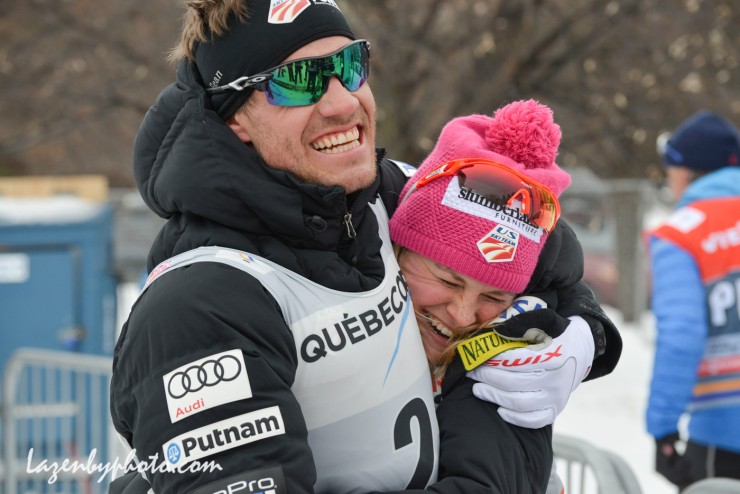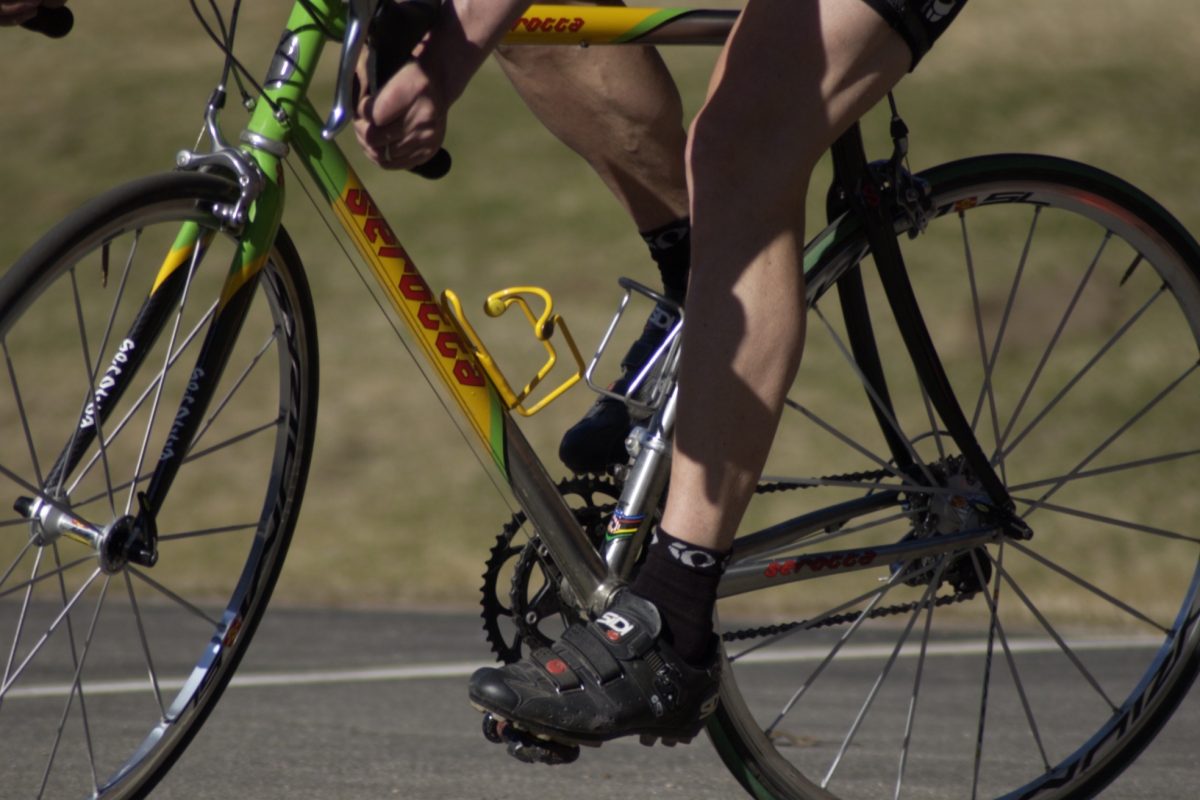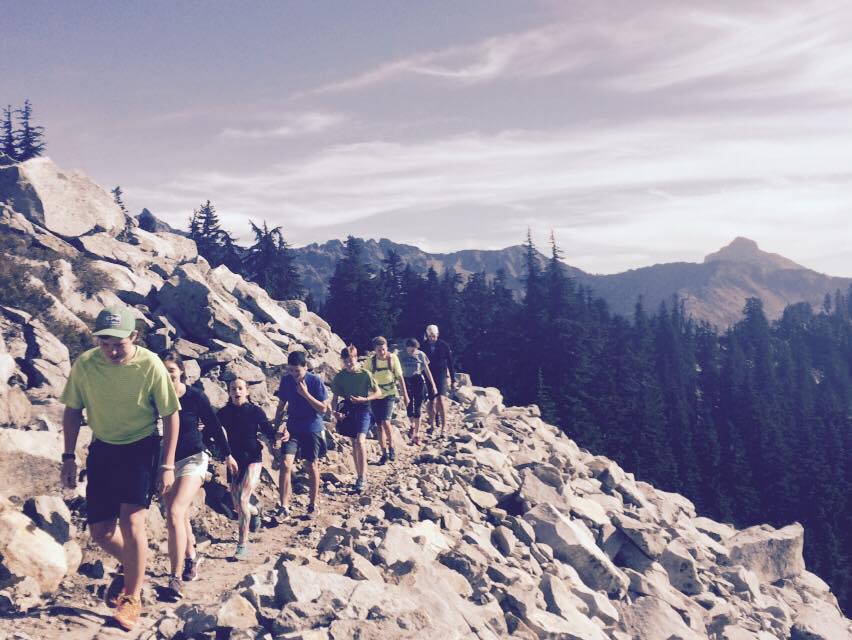
We’re entering the homestretch for the 2015/2016 FasterSkier awards, chosen by our staff based on performances last season. While not scientific, these points of recognition are intended to reflect a broader sense of the season in review.
The following set of honors goes to outstanding North American male and female cross-country performances of the year. See also: biathlon performances of the year.
Previous categories: Breakthrough Skiers (Canada & U.S.) | Biathletes | Coaches | Collegiate Skiers | Continental (Canada & U.S.) | International Skiers and Performances | Juniors| Nordic Combined | Para-Nordic
***
On the women’s side, FasterSkier selected two North Americans to share the honor of performance of the year. Since we’ll honor their performances chronologically, Sophie Caldwell is up first.
- Sophie Caldwell (U.S. Ski Team): Winning the classic sprint at Stage 4 of the Tour de Ski in Oberstdorf, Germany
Early this year, Sophie Caldwell became the third U.S. woman ever to win a World Cup race. She etched her legacy by winning the Tour de Ski’s Stage 4 classic sprint in Oberstdorf, Germany. Not only was it Caldwell’s first win, it was also the first-ever classic sprint win for an American woman. It proved what many witnessed during the season, that Caldwell, 26, has become an omnipresent threat to qualify, and then move through the heats. By season’s end, Caldwell was the seventh-ranked sprinter on the World Cup.
In 2014, the Vermont native scored five top-10’s, four of which were in freestyle sprints. In 2015, Caldwell posted two top-10’s, both skate technique. That pattern continued in 2016 — five top-10’s, four of five in freestyle sprints. Of all her top-10’s, there are two classic technique outliers during her three-season World Cup career. One of those is her classic sprint victory in Oberstdorf.
A surprise? Just a bit because it was a classic sprint. Her classic sprint victory surely didn’t fit with her lopsided freestyle results.
A surprise to see her name atop the results sheet? Not really.
Back in 2014, she was the eighth-ranked sprinter overall on the World Cup. This year, she began the season charging up the ranks. Starting with the second World Cup sprint on the calendar in Davos, Switzerland, Caldwell placed sixth, then seventh in the next sprint in Toblach, Italy, fourth in Lenzerheide, Switzerland, and ultimately first in Oberstdorf, without missing a beat.
- Jessie Diggins (U.S. Ski Team): Winning the 5 k freestyle at Stage 6 of the Tour de Ski in Toblach, Italy
For Diggins it was a breakout year with numerous breakout performances. Tasked with choosing her 2016 best was a no-brainer. Her gutsy — when is she not?— simply screaming-fast skiing in Toblach, Italy where she exploited a course suited to her strengths was her gem.
Here’s the rundown on where the win stands:
– Fourth U.S. women (just days after Sophie Caldwell’s classic sprint victory) to win a World Cup
– First U.S. woman to win a modern distance World Cup
Diggins’ name is now forever linked with the U.S. Ski Team’s emergence as a world power. She’s achieved two World Championship medals, a 10-kilometer freestyle silver in 2015 and a 2013 gold with Kikkan Randall in the team sprint. And just this year, Diggins scored four individual podiums.
Mining the International Ski Federation (FIS) site for Diggins-data, a surprise emerges: prior to this year, she had never stepped on the podium in an individual World Cup (non-championship) event. In 2016, the 24-year-old Minnesota native earned four individual podiums including her 5 k distance win.
“You need to have kind of everything perfect to have such a good race,” Diggins said in the press conference after her Toblach stage victory. “You have to have really good skis and your head has to be in the right place and then your body has to feel good, so it’s really exciting for us that it all worked out so many times this year.”
Finishing the year ranked eighth overall on the World Cup — ninth on the distance list and eighth on the sprint list — Diggins is poised to do what she’s done before. So surely in the future when as Diggins says, “everything is perfect,” it should all seem like déjà vu.
- Alex Harvey (Canadian World Cup Team) at the Ski Tour Canada
With a legacy surname, he’s the golden child of Quebec. And he’s able to back up that notoriety with results. At the inaugural Ski Tour Canada (STC), Harvey was the face of both Canadian pride and its expectations.
Getting into gear on the STC’s Stage 3 skate sprint in Quebec City, Harvey placed second for his best sprint result of the season. Considering the pressure and the depth of competition, that effort alone could have sealed the deal for North American performance of the year. But it was Harvey’s native province, and close to his hometown, with hoards of local fans cheering him on. It seemed like almost a slam-dunk scenario for popping a result. But despite this being Harvey’s first sprint podium of the season — it was one of two top-10 World Cup sprint results for Harvey — all things considered, FasterSkier was looking for something just a little bit more.
And Harvey provided.
Canmore as a venue is a tease. Big-time alpine walls, the Bow River snaking through the valley, and an Olympic legacy venue make the Canmore Nordic Centre feel idyllic. Then there’s the nearly 5,000 foot altitude and courses with grinding uphills and steep technical downhills affording racers little recovery time. It’s these attributes that historically have been unkind to Harvey.
Prior to the STC, in four World Cup starts in Canmore between 2010 and 2012, Harvey’s results trended towards the lackluster: there’s a 62nd place, a 48th, an upward-looking 11th, and a 52nd. Not results one would reference if they thought Harvey and Canmore were an amalgam for success.
“When I was a junior I was struggling to be top three in Canada just on this course,” Harvey, 27, said moments after finishing Stage 7. “And I’d be top three at World Juniors. Canmore has been really hard on me in the past … I never thought I would be strong internationally on a course like this.”
That all changed for Harvey in that seventh stage, the 15 k freestyle individual start during which Harvey remained in the victory-hunt for nearly the entire race. At the race’s mid-point, Harvey posted the second-fastest split, only 1.2 seconds behind eventual third-place finisher, Sweden’s resurgent Marcus Hellner.
As the race progressed, the nail biting became more tense. At 12.7 k, Harvey faded slightly, and ultimately was fourth fastest, again behind Hellner in third by 3.3 seconds.
Harvey, starting in bib 31, finished fourth on the day. But he sat in second place for a bit and tenuously clung to the podium as the later starters rolled across the line. Ultimately, Finland’s Matti Heikkinen placed first, with Russia’s Evgeniy Belov in second.
“Today I’m fourth, so anything is possible,” Harvey remarked post-race. “Today, to me, that’s what it shows,” he added. “That anything is possible.”
A quote like that coming from a skier of Harvey’s stature means he understood the odds were stacked against him on the day.
Harvey finished the Tour fifth overall and he persevered in a place where he’s been more than likely to fade off the back. That’s worthy of the North American male performance of the year.
Honorable mentions:

- Simi Hamilton (U.S. Ski Team): second place in the freestyle sprint in Toblach, Italy
Two podiums, a third place on the STC’s Stage 1 freestyle sprint in Gatineau, Canada and his second place last December in Toblach, were the high points of Hamilton’s consistent season. He finished the season as the best-ranked North American male sprinter in 10th overall. His podium in Toblach was a result of Hamilton’s shrewd and tactical skiing — a combination we are likely to see propel him onto more podiums.
- U.S. women’s relay: second place in Nove Mesto, Czech Republic
It was a dream relay team ready for a step up. Sophie Caldwell, Sadie Bjornsen, Liz Stephen, and anchor Jessie Diggins led the U.S. women’s team to a best-ever 4 x 5 k result with its second place in Nove Mesto. Prior to this race, the women had notched several third-place podiums. Now it seems they are knocking on Norway’s door. Time to rest up those relay socks!
- Jessie Diggins: third place in Stage 1 of the STC in Gatineau, Quebec
No doubt, Diggins emerged as a star this season. On this day in Gatineau, Diggins complimented Simi Hamilton’s third place with a third place podium of her own. Diggins was a threat all day, qualifying in second, moving through her quarterfinal in first, and then a photo-finish second place in her semi. Make way for Diggins, there’s more to come.



